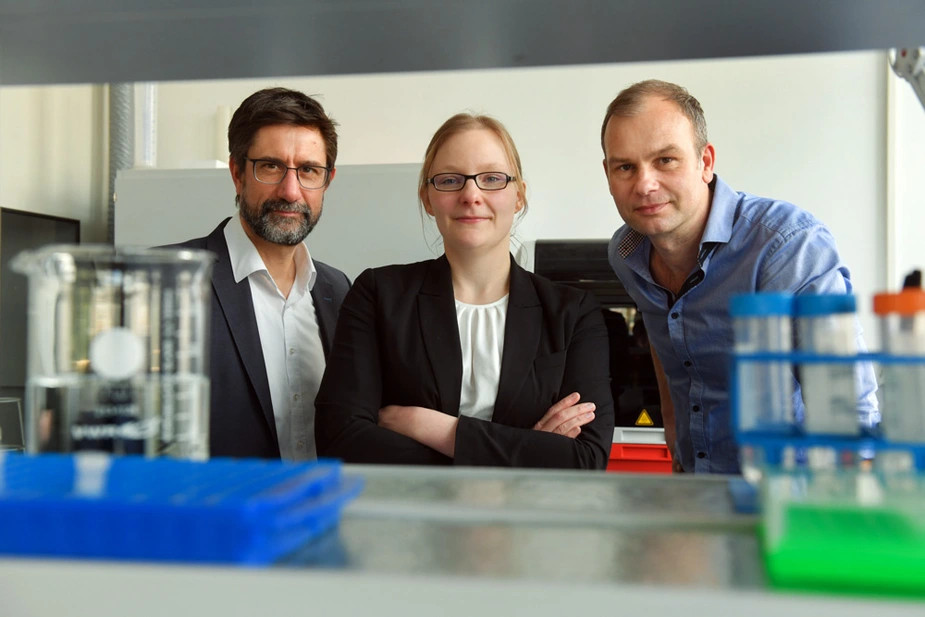Robust Immune Diagnostics
The young company Epimune GmbH is detecting immune diseases with epigenetic methods
Epimune GmbH is a young Adlershof-based company. Yet, its developments in immune diagnostics are founded on established procedures. The start-up has its sights on inherited and acquired immune disorders and leukaemia. An epigenetic approach is said to make the complicated diagnoses more simple and robust.
Inherited immune defects stretch current medical diagnostics to its limits. About 300 different diseases exist, some of them very rare, some deadly. Others can affect people throughout their whole lives without being discovered. The earlier therapy is started, the better are the chances of recovery. In new-born infants, such malicious immune defects often go undetected because they are protected by the mother’s immunity.
“There exist numerous acquired diseases alongside inherited diseases, where doctors rely on precise monitoring of immune cells,” Christoph Sachsenmaier explains. Seamless monitoring is also required after organ transplantations, where the immune response is targeted to prevent the rejection of the new organ. Moreover, monitoring the immune system plays a significant role in the early detection of leukaemia.
The mission of Epimune GmbH is to facilitate this seamless monitoring. Although it was founded in Autumn 2017, the company behind the company, Epiontis GmbH, is not a newcomer. During the last 15 years, it has developed into a robust medium-sized company with 30 employees. Sachsenmaier, who is responsible for strategic business development, has worked in biotechnology for many years, which has included a stint at the Berlin-based Epigenomics AG.
Epimune not only builds on the experience but on a method developed by Epiontis for quantifying immune cells in human blood. Epiontis is currently using its technology, which is protected by multiple patents, for pharmaceutical research instead of medical diagnostics. With incredible success: 17 of the 20 largest pharmaceutical companies worldwide use the Adlershof-developed method.
Since October 2017, Epiontis is part of the US company Precision for Medicine, which supports pharmaceutics and life science companies all over the world with developing and marketing new products. With the support of the new owner’s 1,000 employees, Epiontis is now going forward with the founding of Epimune, which will transfer the established method to clinical diagnostics.
“This step has been long overdue,” says Sachsenmaier. Compared to existing diagnostics procedures, their method has many advantages. Quantifying immune cells requires substantial amounts of blood which are analysed using flow cytometry, that is light and fluorescence markers. This method relies on well-equipped, close-by laboratories because the blood must be examined shortly after the samples have been taken. For monitoring HIV patients in poorer world regions, for example, this is insurmountable obstacle. Secondly, the considerable amounts of blood required stand in the way of effective screening of new-born infants, which saves many lives.
The Epiontis procedure requires only a drop of blood, which can be dried or deep-frozen, because it does not involve counting live immune cells but identifying their epigenetic codes. Why is that? All cells start out with identical genetic make-up and then proceed to differentiate into various cell types with certain function – this process is steered for the most part by epigenetic mechanisms. The researchers from Adlershof are tracing the cells’ epigenetic features, which, like DNA, are detectable and stable for a long time.
Alongside the simplification of logistics – blood can be stored and even shipped worldwide – the epigenetic approach has another crucial advantage. It does not only scan the blood for individual cell types but provides a big picture of existing immune cells. Faced with a multitude of defects, this type of broad-band diagnostics is a huge step forward. One drop of blood will suffice to scan the entire range of defects in new-born infants.
“Thanks to the robustness and simplicity of our procedure, patients could soon use a small device to monitor their immune system, for example, during HIV treatment. It could also make early detection of leukaemia much simpler,” says Sachsenmaier. However, the founders have a lot of work ahead of them before these visions become reality. Validation in a clinical trial is still pending. The company also requires the CE marking for in-vitro diagnostics products. Furthermore, health insurance providers and doctors must be convinced of the advantages of new epigenetic diagnostics. Their arguments are certainly persuasive.
By Peter Trechow for Adlershof Journal
